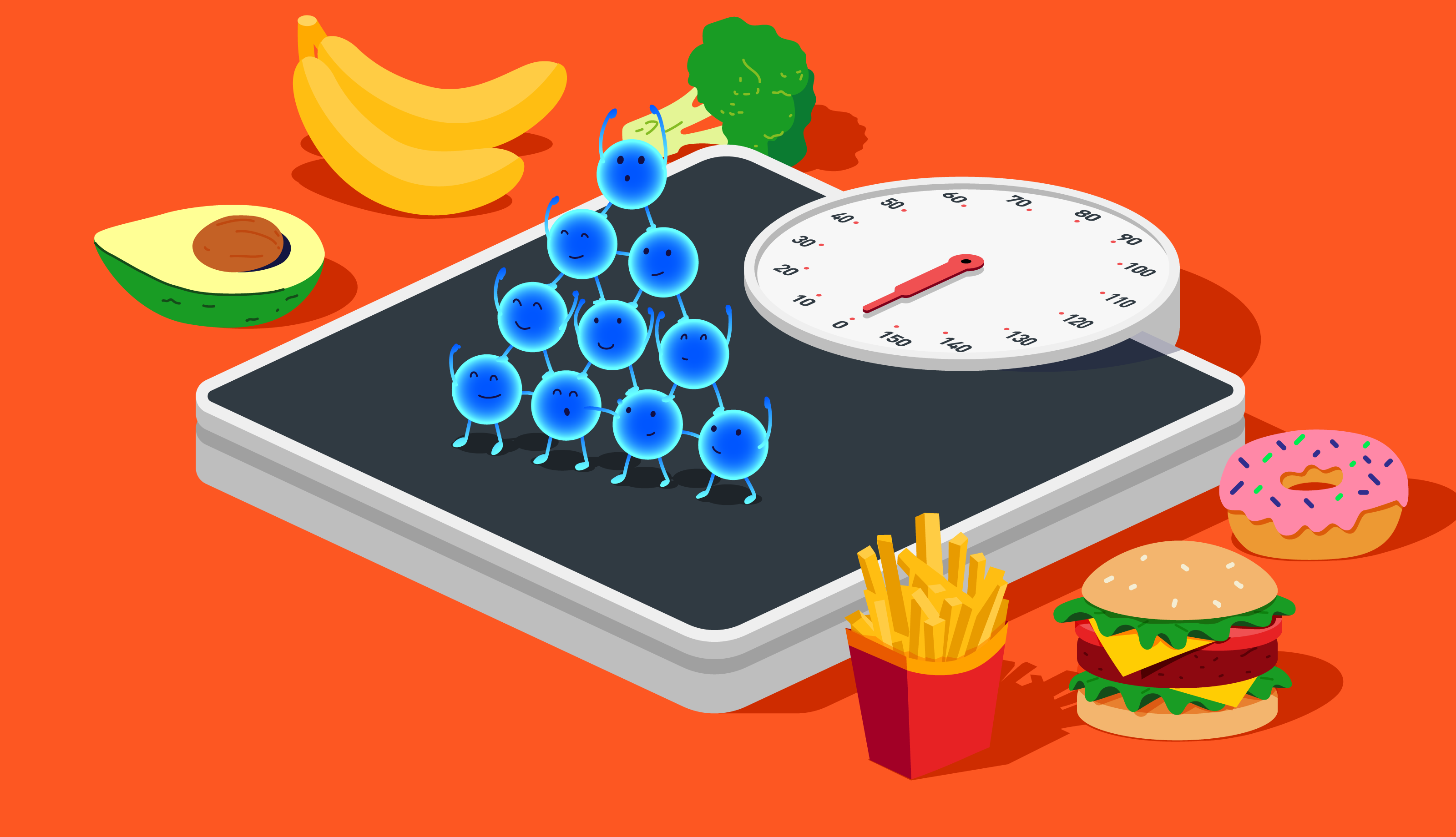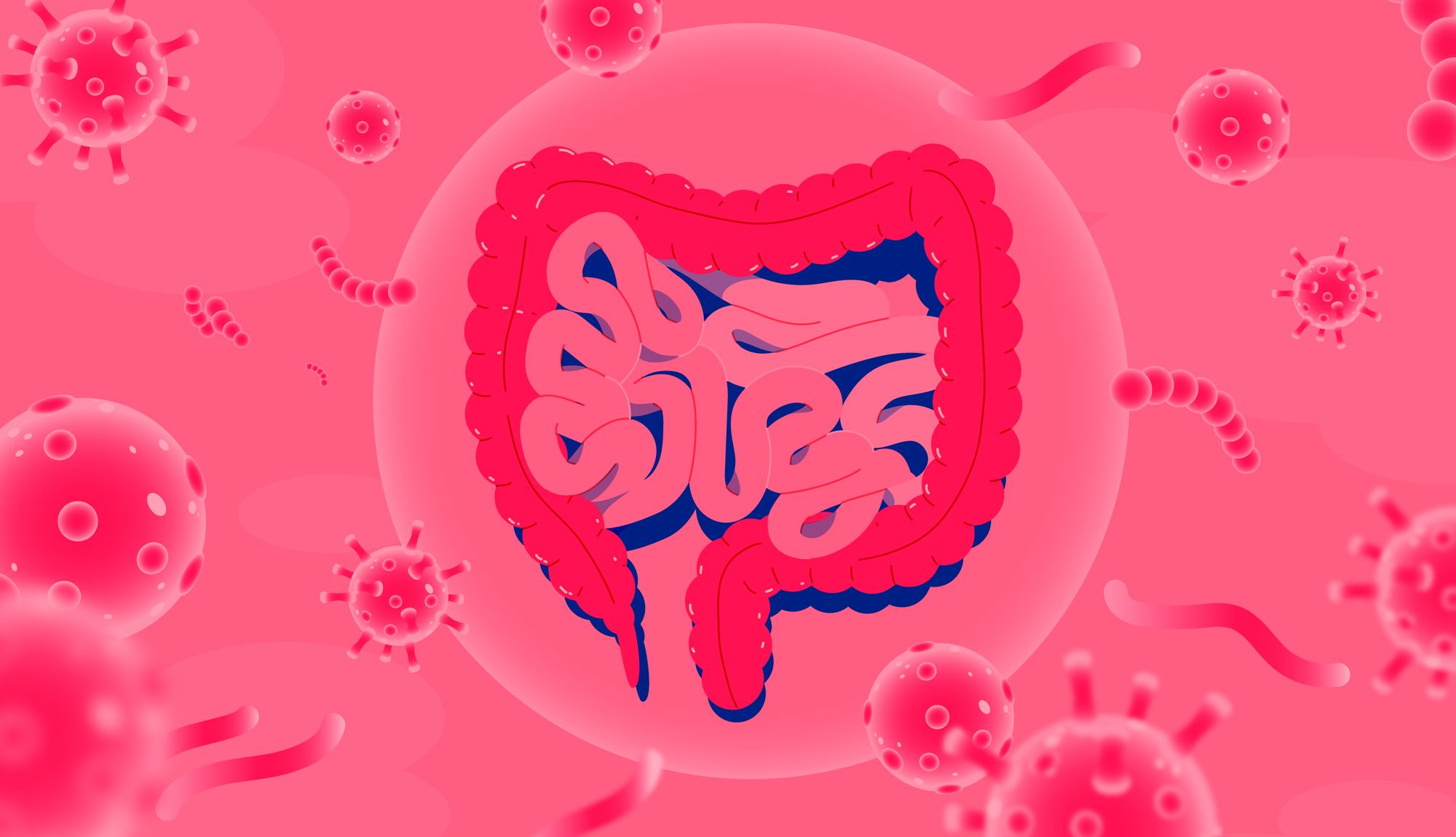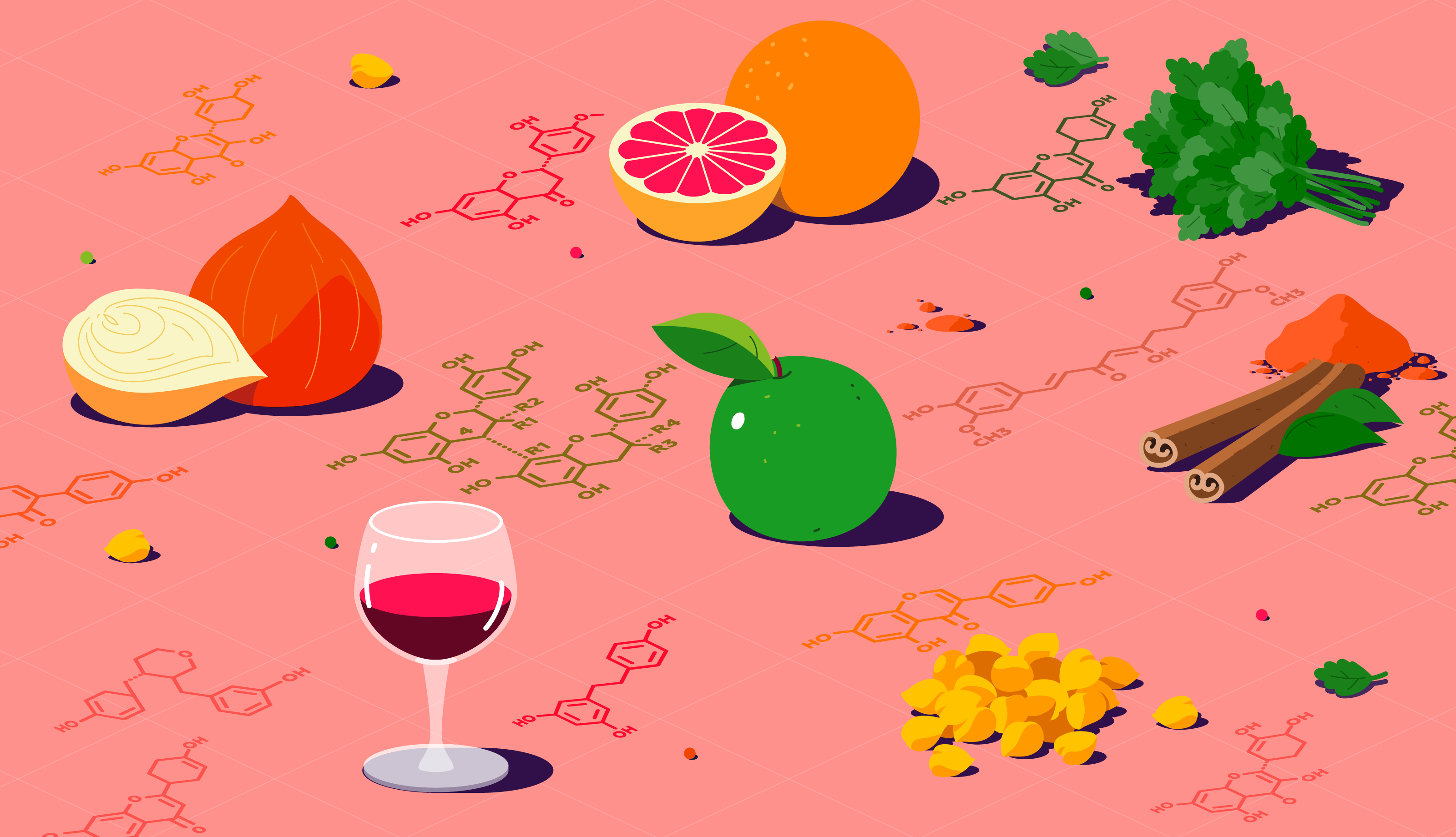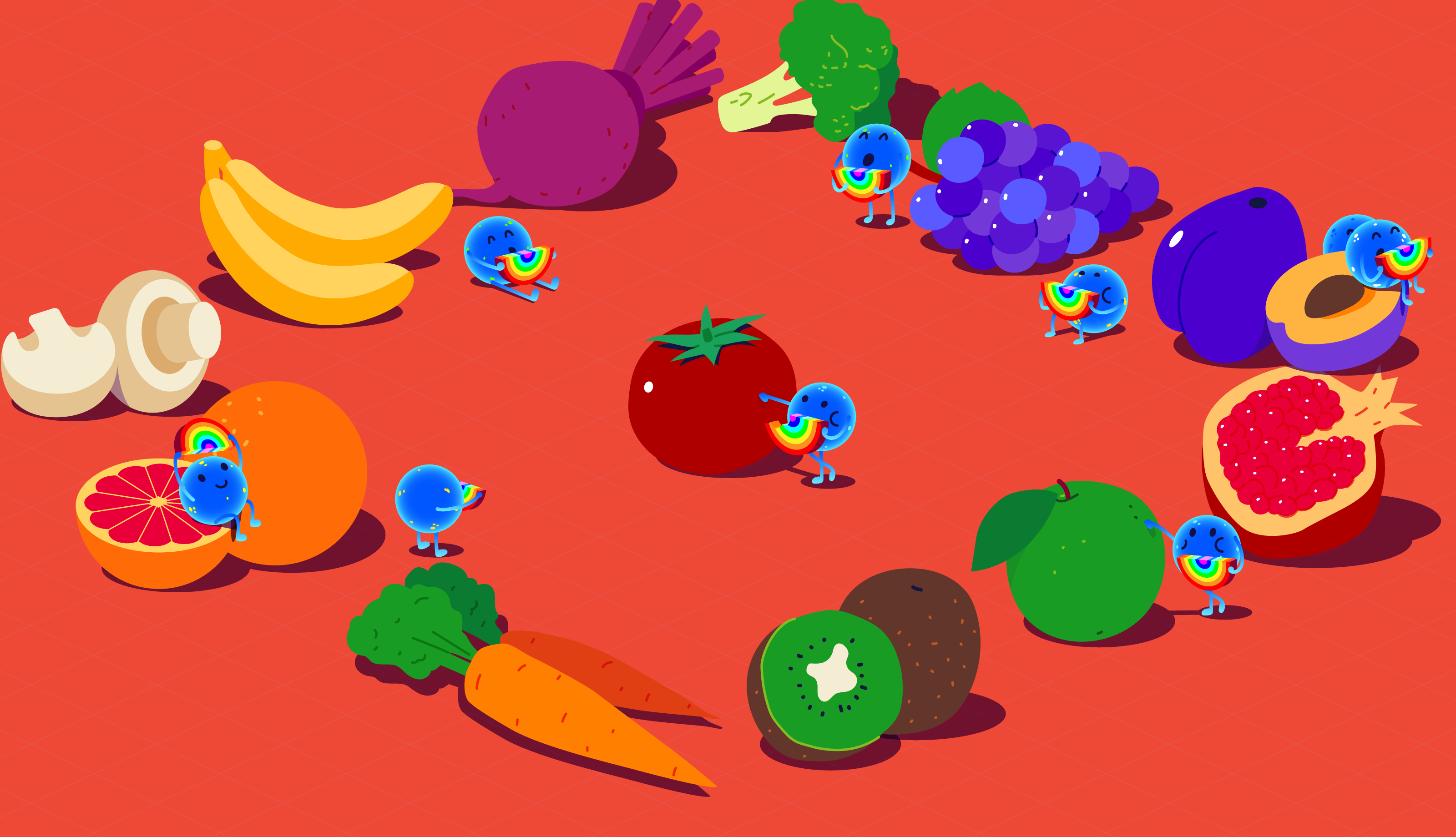It's commonly thought that weight gain is the result of eating too much, but there’s much more going on. Even gut microbes can help explain why you’re getting too big for your clothes.
Your colon is home to trillions of symbiotic bacteria which altogether are known as the gut microbiota. No two microbiomes are the same because they are a product of many diverse influences like your birth, diet, environment, and lifestyle.
Your gut bacteria have many roles within hunger, digestion, stress, and even mental wellbeing. So, it’s probably more important than you ever realised. Fortunately, it goes both ways, and you can positively influence this ecosystem too.
Table of contents
- Gut bacteria extract energy from food 101
- Bacteria that protect against extra body weight
- Obesity, the Western diet and gut microbes
- Bacteria talk to your brain and eating habits
- Foods to nourish your anti-pudge bacteria
The food you put into your body can influence the bacteria in your gut and this can affect the likelihood of weight gain or, indeed, staying lean and fighting fit. In other words, a balanced microbiome can help maintain a healthy body weight, but an imbalanced one may extract more energy than you, adding on extra pounds.
Gut microbes extract energy from food
Gut microbiome diversity is essential because different bacteria do different things, and this helps protect against weight gain.
Our gut microbiota is complex - we rely on it to stay healthy, but we need to feed the beneficial bacteria for it to do its job. A diverse and nourished ecosystem helps manage body weight by influencing your metabolism, but chronic imbalances can cause problems, and it’s called dysbiosis.
When this happens, opportunistic bacteria can be more abundant while beneficial bacteria decline. There may also be fewer types of bacteria (low diversity). You can influence these factors with what you eat, and it can help explain weight gain.
Like squirrels, your bacteria break down food into digestible morsels
To find out how, we looked at research on the microbiome of obese individuals. You might be thinking right now, “But I’m not obese, not even close, what’s this got to do with me?”. So let us explain, obesity is a metabolic disease characterised by very high body weight and elevated blood sugar, cholesterol, and fats.
And although these are extreme cases, they’ve helped scientists explain what’s going on with bacteria in the gut. That’s because gut bugs don’t just make rainbows and unicorn kisses, they have a basic motive for existence (not unlike us), and it’s FOOD.
Bacteria use tiny tools to break down food particles into energy and, in the process, they leave behind metabolites, which can tickle the gut lining into doing things, or be absorbed by the gut into the bloodstream. Some are just removed when you visit the loo.
Beneficial gut microbes break down the complex carbohydrates in whole plant foods by fermentation. Essentially, this turns your gut into a fiber processing plant whereby short-chain fatty acids (SCFAs), vitamins, and other metabolites are produced.
These SCFAs are a vital energy source for the gut, and they are also signalling molecules. They send messages between different cells in your body, but also to the vagus nerve (that sends messages to your brain), and this can affect both food intake and metabolism.
Although the mechanisms behind it are still shady, scientists agree that the gut microbiota plays a role in regulating the activities of your gut lining, appetite regulation, and even blood glucose control. At the same time, many scientific studies show that lack of diversity in the microbiome is common amongst overweight and obese individuals.
Bacteria protect against weight gain
Some microbes help protect us from weight gain and obesity by strengthening the gut lining and maintaining healthy metabolic markers.
Akkermansia muciniphila munches on the mucus that covers your gut lining, which encourages the intestinal barrier to produce more. This makes it stronger and thicker, preventing unwanted metabolites and toxins from entering the body that would trigger an immune response and inflammation.
Managing how much glucose enters your bloodstream is important. When you have healthy levels, your body uses it as energy and you don’t put on weight. But when there’s too much, insulin tells the cells to store all the extra in your fat cells - and they’re usually around the waist.
Fats like triglycerides and cholesterol (which is part fat, part protein) can enter the body via the gut from food. As you probably already know, being overweight is also associated with high levels of these substances in the blood. It’s not yet very clear how bacteria influence this, but their activities can help manage blood glucose and lipids.
There’s lesser-known bacterium called Christensenella minute that has also been detected in slim people. In mice studies though, the bacteria has been shown to reduce weight gain. Therefore, it is a promising candidate for obesity prevention, particularly as it supports a healthy microbiome.
Obesity and the Western diet
Obesity and high-fat, high-sugar foods are also associated with a less diverse microbiome that’s not as good as keeping the gut healthy.
Research has shown that there are distinct patterns of dysbiosis in obese individuals. Compared to healthy humans, people who are overweight tend to have a reduced abundance of Bacteroidetes and an increase in Firmicutes.
This Bacteroidetes-to-Firmicutes ratio is associated with an increase in low-grade inflammation and greater extraction of energy from food, which can lead to elevated blood sugar and fat levels that damage the blood vessels and cause inflammation. Both of these markers are associated with overweight and obesity.
You need a whole bouquet of microbes to help maintain your health
People who have a more diverse microbiome usually have a greater abundance of butyrate-producing Faecalibacterium prausnitzii and Akkermansia muciniphila. Both microbes are linked to better metabolic health. They also help maintain the gut lining so it works as an effective barrier and doesn’t let unwanted substances into the body.
The Western diet and obesity are both associated with increased permeability of the gut lining too - meaning your gut is open for business longer, and busy extracting energy for longer periods, which means there’s more energy for your body to store as fat.
It can also let more lipopolysaccharide (LPS) into the body. This inflammatory molecule is found in the outer casing of some gut bacteria, and elevated LPS levels are also detected in blood samples of obese patients.
The gut-brain axis and metabolism
There is a bidirectional communication channel between your gut and the brain, which can influence your eating behaviour.
Acetate is a short-chain fatty acid produced by many beneficial gut bacteria, including Akkermansia. Research shows that acetate produced by the microbes in your gut bacteria can travel to a specific part of the brain called the hypothalamus, a region that regulates appetite.
Beneficial gut bacteria can also stimulate hormone production in the gut. These substances can act as communication molecules, influencing food intake via the brain. Interestingly, of the whole gastrointestinal tract, the colon (where your microbiome lives) has the highest concentration of taste receptors.
The research community is still debating this, but it’s suggested that gut bacteria may even be able to influence these taste receptors, and somehow, send you hints about what you want to eat. So your dietary decisions might not just be yours alone.
The taste receptors that assess bitterness are also in the gut and they can respond to bacterial stimuli. For this reason, researchers suggest that bacteria may be able to interact with your food preferences and, by doing so, play a role in weight gain.
There’s good news. Even if you can’t change your genetic make-up, you can improve the composition of your gut microbiome by nourishing the beneficial bacteria that help maintain a healthy body weight and metabolism.
☝️TIP☝️The Atlas DNA Test can see whether you are genetically predisposed to disliking bitter flavours based on reliable scientific evidence.
Foods to nourish your anti-pudge bacteria
Beneficial gut microbes love plant foods and good fats. In return, they can keep your gut happy and your body healthy.
You’ve probably heard enough about eating “healthy”, but we’re going to be straight with you. There’s no way around it. Whole plant foods like vegetables, fruit, seeds, and nuts, as well as grains and legumes, are simply essential for a balanced and healthy body.
Not only do they contain fiber to help you poop better, but they’re less energy-dense than refined sugars, and that means they don’t make your blood sugar spike. Instead they are digested slowly, and they also feed your gut bacteria because many of their components can’t be broken down by the body, but gut microbes can.
We’ve compiled a list of top foods to nourish the beneficial bacteria in your gut. But you shouldn’t just limit yourself to them. You should get at least 30g of fiber every day (that’s right) from whole foods. Research also shows that people who eat 30+ different plants of the food rainbow (red, orange, yellow, green, and purple/blue) every week have the most microbiome diversity.
| Grains | Vegetables | Fruit |
|---|---|---|
| rye | onions | apples |
| barley | beetroot | pears |
| oats | garlic | cranberry |
| wheat | Jerusalem artichoke | blackberry |
| beans | mushrooms | citrus |
Studies have shown that long-term weight gain in humans is related to low microbial diversity within the gut. And this is made worse by not eating enough fiber. So, incorporating more fruits, vegetables, and wholegrains into your daily eating routine will promote the growth of healthy bacteria and protect you from obesity.
And don’t forget to exercise. Just because you’re eating lots of fiber and cutting down on your saturated fat intake doesn’t necessarily make you healthy. Participating in physical activity is also necessary to protect you from weight gain and metabolic disease.
☝️TIP☝️Find out what's going on with your gut bacteria with the Atlas Microbiome Test. Get 10% off when you sign up for the Atlas blog.
- Baothman, O, A et al., 2016. The Role of Gut Microbiota in the Development of Obesity and Diabetes. Lipids in Health and Disease: 15.
- Blottière, H, M. The Gut Microbiota and Obesity.
- Dao, M, C et al., 2015. Akkermansia muciniphila and Improved Metabolic Health During A Dietary Intervention in Obesity: Relationship with Gut Microbiome Richness and Ecology. Gut: 65, pp 426-436.
- Feng, W et al., 2018. Gut Microbiota, Short-Chain Fatty Acids, and Herbal Medicines. Frontiers in Pharmacology.
- Galgani, J and Ravussin, E., 2010. Energy Metabolism, Fuel Selection and Body Weight Regulation. Int J Obes , pp S109-S119.
- Gerard, P., 2016. Gut Microbiota and Obesity. Cellular and Molecular Life Sciences: 73, pp 147-162.
*Neves, A, L et al., 2013. Metabolic Endotoxemia: A Molecular Link Between Obesity and Cardiovascular Risk. Journal of Molecular Endocrinology: 51, pp R51-R64.](https://jme.bioscientifica.com/configurablcontent pagege/journals$002fjme$002f51$002f2$002fR51.xml) - Rastelli, M et al., 2018. Gut Microbes and Health: A Focus on the Mechanisms Linking Microbes, Obesity and Related Disorders. Obesity: 26(5).
- Tremmel, M et al., 2017. Economic Burden of Obesity: A Systematic Literature Review. Int J Environ Res Public Health: 14.
- Valdes, A, M et al., 2018. Role of the Gut Microbiota in Nutrition and Health. BMJ.
- Turner A et al., Interactions between Bitter Taste, Diet and Dysbiosis: Consequences for Appetite and Obesity, Nutrients, 2018























